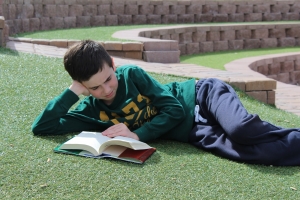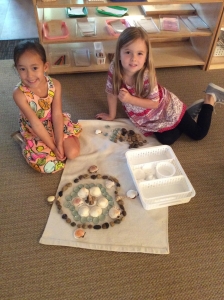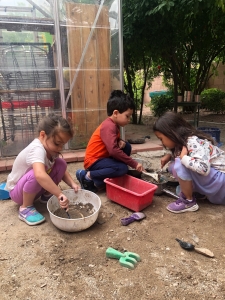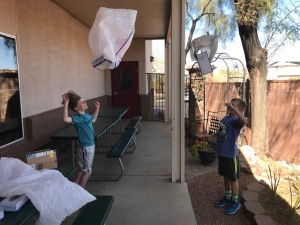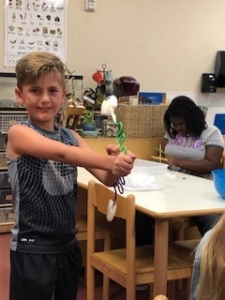Loose Parts and Tinkering
“Happiness is absorption, and absorption is the opposite of willful attention.” * The development of willful attention is a major goal of education, and specifically Montessori education. Concentration, order, coordination and independence are the fundamental pillars of Dr. Montessori’s educational philosophy and yet, now in this technological age when children spend very little time outside just hanging out and playing with what nature offers, FMS is embracing an educational initiative called “loose parts” and “tinkering.”
It is a philosophy that advocates for more outside time in general for students doing common activities like reading and learning in small groups and, specifically, it also advocates providing students with common household items to “tinker with.”
Teacher guidance is minimal and student creativity is dominant. Common items found at home like buttons, Q-tips, plastic hoses, smooth rocks, small sticks, etc. are offered to the students for them to handle and create freely. Emphasis is on the process of grouping items together in unique ways, fulfilling a student’s vision at that moment, then returning items to the shelf. Nothing goes home, no product is made.
Tinkering allows for individual expression and creativity when children get their hands on materials and are experiencing the flow of the minute they are in. It also encourages communications and socialization among students as they problem solve, negotiate solutions, and drive towards common visions.
Using small and large items encourages both fine motor and large gross motor skills. Ms. Val, lead teacher for the outdoor classroom, has been experimenting with this concept using big empty cardboard boxes to create a play space, along with setting up a “mud kitchen.” She has seen very positive results.
We are experimenting with this idea in our school overall and Ms. Rosie, our lower elementary head teacher and department head, is leading the charge to educate FMS teachers on the philosophy and practical application of this initiative.
Much of the idea is to do tinkering and “maker spaces” outside where large motor skills can be used to build temporary, interactive, child-directed applications. “Playing and experimenting are key themes for the loose parts philosophy with inspiration for this: Tinkering Tenets • Merge Science, Art & Technology (with the Outdoors!) • Reinvent old technologies (and discover new ones) • Use familiar materials in unfamiliar ways • Embrace your tools • Seek real-world examples everywhere • Create rather than consume • Put yourself in messy, noisy & sometimes dangerous situations.”**
“Kids will play with anything. Literally, ANYTHING. Early learning professionals frequently cite a long list of benefits that playing with loose parts bestows on developing humans: creativity, dexterity, problem-solving, socialization and teamwork, to name a few. Given the universal kid-love of building random stuff from random stuff, it is heartening to see designers exploring ways to bring this form of play out of the indoor environment and into the public arena.”**
As FMS curriculum continues to build on the Montessori foundations, it also evolves to meet the needs of current students. Bringing “loose parts” into the school and actively encouraging “tinkering” acknowledges the need for students to also have unstructured time for themselves to experiment, create, and interact with others in a social, temporary situation.
*A. Gopnik, New Yorker, 5/20/19
**The Art of Tinkering by Karen Wilkinson & Mike Petrich



